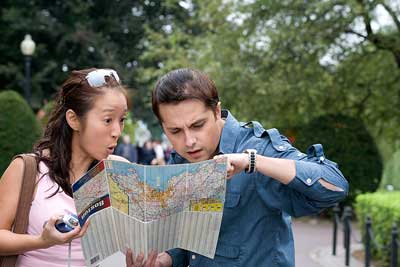Todd: So, Greg, you are quite the world traveler I hear.
Greg: Um, yeah, I love traveling. I've been to probably around, I don't know, 20 different countries. I've lived in Thailand and South Korea and United Arab Emirates, and four different parts of Japan
Todd: Oh, that's a lot.
Greg: And of course several different places in the U.S.
Todd: Well, for somebody who's going to travel for for the first time, what type of advice would you give them, so you know, in case they never get lost.
Greg: Ah, getting lost. (Right) Yeah, that happens all the time. You have to prepare for that. Some of the, one of the first things I do whenever I get to an airport is I see if I can get a map from the information center. I go to a hotel. I ask if they have a map of the area. When I want to go somewhere, I ask then to write the destination in the local language, and also I practice my pronunciation with them, and sometimes I'll, almost always actually, I get a business card or a match book from the hotel to where I'll be returning (right, right) and then I go off on my merry way.
Todd: OK, well, let's say that um, you're on business in a foreign country, and it's really busy and you forget to get the business card, you don't have the map, you're trying to find someplace and you're completely lost, what should you do?
Greg: Well, of course, you've got to ask people. (Right, right) and it's a good idea to ask a lot of different people because in some countries people don't want to say no, but they don't want to say I don't know, right. They give you some directions, or maybe they don't understand you, and they give you the wrong directions, so even if you think you got good directions the first time constantly check with other people along your way.
Todd: Well, so when you're going down the street, and say you are lost, is there a certain type of person you look for like let's say an old lady or children. Is there a certain person who is better at giving directions?
Greg: Um, well, if it's a child, and you want to get to a business section or something, probably they don't know. (Right) It's a good idea to ask somebody who looks as if they live in the area, and not just another, sorry, tourist passing through or something.
Todd: Right, right, right. So you're talking about people who work in shops and things like that?
Greg: Yes, and also though, delivery men are usually very good, cause they have to go all over the city, so they know it well.
Todd: Right. So have you actually ever been lost?
Greg: Oh, I've been lost all the time. Once I got lost for a couple hours in Bangkok and it was terrible.
Todd: Well, that's a pretty, that's a pretty intense city.
Greg: Yeah, so after that, it gave me the idea that I should always check for landmarks, you know landmarks are really tall buildings, or a river, something I could always know, I could see easily, and try to remember, "oh the river's on my right side. Ah, there's a hill over there." Keep looking for it. Remember it
Todd: Well, it sounds like good advice. Thanks Greg.
Greg: You're welcome.
getting lost
Getting lost happens all the time, and you have to prepare
for that.
When you 'get lost' you travel to a place where you don't know where you are or how to return to where you started. Notice the following:
- You should get a GPS because it's very easy to get lost
in the city.
- Do you get lost easily?
business card
When I go to a hotel, I ask for a map of the area or I get
a business card.
A 'business card' is a piece of paper that has the contact information for a person or place. Notice the following:
- Let me give you my mobile number because it's not on my
business card.
- You should give me your business card and I'll give you
a call later this week.
match book
Sometimes, I get a match book from the hotel to where I'll
be returning.
A 'match book' is a pack of matches that come in a small paper folder that has the name or address of a place written on it. These are used as an advertisement. Notice the following:
- We want to have some match books made with our logo on
it.
- The have a basket full of match books by the front door.
go off on my merry way
After I get the stuff I need, then I go off on my merry
way.
The phrase 'go off on my merry way' is used to say that you left a place to do your own thing. It is an informal phrase. Notice the following:
- Let's meet for a few minutes so I can explain everything
to you and then we can both go off on our merry ways.
- Just answer the question and I will leave you alone and
go off on my merry way.
pretty intense city
I got lost in Bangkok and it was terrible, because it's a
pretty intense city.
If a city is 'pretty intense' it means that there is a lot of activity going on and probably a lot of people. Anything that is 'pretty intense' has a lot for the senses to take in and analyze. Notice the following:
- Saigon is a pretty intense city, so some days you just
want to go to a quiet, calm place.
- I've been to quite a few large cities in my life, but
Mexico City was a pretty intense city.
Vocabulary Quiz
merry • intense












